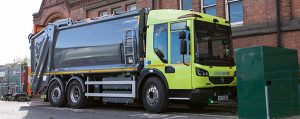Dennis Eagle electrifies Nottingham refuse fleet
 Dennis Eagle has put the first production examples of its eCollect electrically-powered refuse collection vehicles into service with Nottingham City Council. The eCollect is said to be the world’s first fully-integrated, original manufacturer-designed RCV (Transport Operator, 91).
Dennis Eagle has put the first production examples of its eCollect electrically-powered refuse collection vehicles into service with Nottingham City Council. The eCollect is said to be the world’s first fully-integrated, original manufacturer-designed RCV (Transport Operator, 91).
Built on Dennis Eagle’s Elite narrow 6×2 chassis, the eCollect features an Olympus 19m³ body and Terberg split bin-lift. Instead of a Volvo diesel engine and Allison automatic transmission, the eCollect has a 200 kW electric drivetrain and 300 kW/h batteries. Two are now in service in the city.
Before entering production, the design was put through a two-year programme of safety and efficiency testing, then underwent homologation to achieve European Community Whole Vehicle Type Approval.
Dennis Eagle sales and marketing director Richard Taylor said the moment the first eRCV rolled off the production line at Warwick was a landmark, both in the waste and recycling industry, and for the development of electric vehicles.
“The zero-emissions eCollect is a viable alternative to our best-selling diesel vehicle – both commercially and operationally – but it represents much more than that,” he said.
“If you consider that RCVs routinely visit every street where people live in every community in the country, the positive impact of having an emissions-free option in our industry is very significant indeed.
“The fact that we have reached the point where we can produce a 26-tonne vehicle for such an energy-demanding role also speaks volumes about how far electric vehicles have developed in recent years and how much more widespread they will become in the near future.”
Andrew Smith, Nottingham City Council’s assistant manager (fleet), said: “The electric RCV is the Holy Grail of municipal vehicles and we have wanted one for years. So, to finally get our hands on them and put them in to service emptying bins is very satisfying indeed.
“Both eCollects are in operation and both are out-performing the diesels they replaced.
“In the first few weeks we have had these two vehicles in operation we have saved around 60 to 70 litres of diesel per truck per day.
“The drivers love them – they don’t want to go back to diesel RCVs. Our eCollects have been going out at 6.30am and finishing at around 1.30pm, collecting a full load then a smaller one – up to 18 tonnes in total. But they’re coming back with 40 per cent charge remaining. The vehicles are finishing quicker, shaving around an hour off the run time.
“Drivers have a full debrief every day and it’s all positive. They say they’re are easier to drive and they particularly love the extra torque. Parts of Nottingham are quite hilly and diesel trucks can struggle with a big load, but these eCollects take it in their stride.
“So, all in all, we’re delighted with them. And we’re about to increase our charging infrastructure so we can expand our electric fleet – including more eRCVs – next year.”
Unlike some British cities, Nottingham has been able to avoid introducing economically harmful tolls to reduce local pollution by switching much of its own municipal fleet to ‘greener’ power sources. Nottingham City Transport is also a pioneer of gas and electric buses in the UK.
Cllr Sally Longford, Deputy Leader of Nottingham City Council and portfolio holder energy, environment and democratic services, said: “These vehicles are yet another first for Nottingham, adding to our award-winning, innovative fleet of zero emission vehicles which already boasts the first fully electric sweepers, cage tippers and minibuses to be run by a local authority in the UK.
“We are leading by example and electrifying the refuse collection fleet is a major step forward in our aims to deliver clean air in our city and a huge step towards our carbon neutral goals.
“Thirty per cent of our vehicles are fully electric, with no emissions whatsoever and these eRCVs further underline our commitment to having a fleet which consists of as many zero and ultra-low emission vehicles (ULEV) as possible by 2028.”











